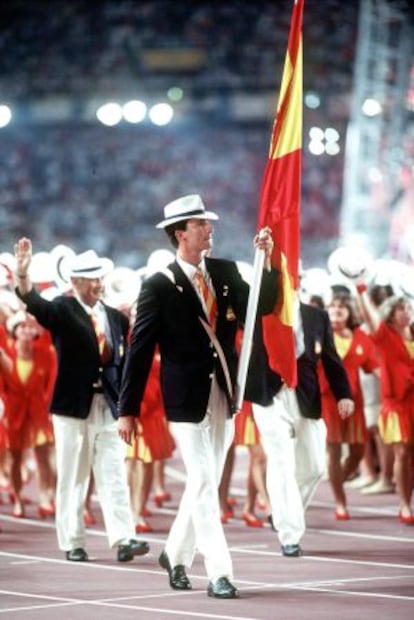An Olympic uniform not made in Spain
Athletes, the fashion industry and the public alike have all reacted with dismay on seeing the designs that Spanish athletes will be wearing at the London Games

Rafael Nadal has dropped out from carrying the flag so he doesn't have to wear that tacky tracksuit." "It's a strategy to make people feel sorry for us and get better conditions for our bailout." These are just a few of the thousands of jokes on social networks that have been prompted by the Spanish Olympic uniform.
With its peculiar esthetics, the outfit - designed and manufactured by a Russian company called Bosco - is not just a threat to the retina. It is also bad news for a Spain brand that is already weak. So say groups like the Association of Fashion Creators of Spain (ACME) and the Federation of Dressmaking Businesses (Fedecon).
"With six million people out of a job and an economic crisis that international media remind us about on a daily basis, choosing a foreign firm to create the Spanish uniform for the London Games conveys the sense that we have neither the creativity nor the entrepreneurial capacity to do it ourselves," complains Ángel Asensio, president of Fedecon.
The Spanish Olympic Committee (COE), which awarded Bosco the contract without a prior public tender, says that their offer was unbeatable: the firm designed and made all the clothes free of charge, which "saved the state coffers more than 1.7 million euros," says Alejandro Blanco, COE president. Besides that, Bosco is sponsoring the Olympic team to the tune of 250,000 euros. This, says Blanco, "is a miracle, especially at the present moment."
Choosing a foreign firm to make the uniforms suggests we lack creativity"
Besides that, the press officer for COE, Chema Bellón, argues that no Spanish brand or designer ever came to them with a proposal.
But fashion designer Juan Duyos points out that they never had a chance. "It's as if someone tells you they're mad that you didn't come to their birthday party when they never even invited you or told you when it was," he says, in reference to the lack of public announcement.
Spain is in no position to pooh-pooh a chance to save money, but if there is ever a time when a certain amount of spending is justified, that would be for the Olympic Games, says communications expert Antoni Gutiérrez Rubí. "We're talking about the longest commercial in history, where not only athletes are being promoted, but also nations and their brands. There is no sponsorship deal big enough to justify this decision. There's been a lack of strategic vision."
Rubí adds that a very important legacy has been lost. "The Barcelona Games went down in the collective imagination as the Olympics of good design and good taste. A legacy can be protected or neglected, as in this particular case," he notes.
ACME president Modesto Lomba underscores that other countries did favor national design. The uniforms of the Italian athletes are designed by Giorgio Armani; those of US athletes by Ralph Lauren, and British uniforms by Stella McCartney (although they were manufactured by the German brand Adidas). Britain also decided to take advantage of its role as games host to promote its textile industry. At the closing ceremony, the English models Kate Moss, Naomi Campbell and Stella Tennant will show off designs by fellow British designers McCartney, Vivienne Westwood and Sarah Burton.
The COE claims that no Spanish designer ever came to them with a proposal
The London Games are not the first in which Spanish athletes have worn uniforms that have been designed or made outside Spain. The Chinese firm Li Ning equipped the team from 2006 to 2010, including the Beijing Games. That is why the COE cannot understand all the present fuss over Bosco's new outfit.
"They're very ugly. They don't have a Latin look at all - they look more like they're from an Eastern European country," complains the canoeist Saúl Craviotto, a gold medalist in 2008 and one of the first athletes to post pictures of himself in the uniform on Twitter.
Mikhail Kusnirovich, director of Bosco, argues that his firm - which also made the uniforms of Ukraine and Russia - "studied the national folklore in great detail to create clothes that are authentic, pretty and very Spanish."
But not even the fan that female athletes will carry, and the flower that will be incorporated into their hairdos, will conceal the similarities between this uniform and the one that the Russian team wore four years ago. The company says it accepts the public debate over their design "with sportsmanship."
When somebody leaked the first images of the uniform last May, the company rushed to say that it was just a sketch and that the definitive design had not been turned in yet. And it never was - officially at least. Bosco promises that "when four billion people watch the opening ceremony on July 27, the Spanish team and their followers will stand out among the crowd." Whether that is because of their impressive image or precisely the opposite is another story.
They're ugly. They look more like they're from an Eastern European country"
But it's not just style that's at stake here. "There is no parade with a bigger audience than the opening ceremony of the Olympic Games, and it should be used to promote the Spanish fashion industry, instead of opening up the market and working for a firm that brings no profit to the fabric of Spanish producers," complains the president of ACME. The Spanish textile sector has lost 50,000 jobs since the crisis began, according to data provided by Fedecon.
The Spanish Olympic Committee chief admitted that Bosco, whose turnover last year was 600 million euros, "is using the COE as an emblematic point" in its strategy to expand in southern Europe. The president of the Russian firm makes no bones about it: "Bosco is committed to Spanish sports, and the design and production of the uniforms is just the beginning."
Bosco declined to make any comments as to its plans to open up stores in Spain. For now, the hitherto unknown company (from a Spanish viewpoint, anyway) has been on everyone's lips over the last two months. But some people, like Craviotto, do not believe that this is the best way to get off to a good start in the Spanish market.
In Gutiérrez Rubí's opinion, the decision to choose Bosco has also wasted a precious chance to show off the Spain brand to the world.
If the goal of this star project by the Foreign Ministry was to ward off the effects of the crisis and improve the global perception of Spain, is there any more efficient formula than associating the country with sport, one of the few Made in Spain products that are still admired and envied worldwide?
"Millions of eyes are going to be following our soccer players, our tennis players, our basketball players... because these include some of the best in the world. Replicating that kind of repercussion is very difficult. That is why they should be the centerpiece of the Spain brand strategy, and within that strategy, uniforms play a determining role," explains the communications expert, Rubí.
There is no parade with a bigger audience than the opening ceremony"
Boscogate has not exactly improved the COE's prestige, either. The association of fashion creators feels that the right thing to do would have been to admit the mistake and correct it. But Alejandro Blanco claims that by the time the controversy flared up, it was too late to do anything about the design: "There is no time in two months."
Yet Fedecon president Ángel Asensio says that at a meeting called by Jaime García-Legaz, state secretary for commerce, between the COE and representatives of the textile industry, the Cortefiel group offered to design and produce the entire uniform in a month-and-a-half.
"The COE explained that it has a contract with Bosco until 2016. So, in theory, this issue is going to be harmful for many more years to come. Our athletes will wear a Russian brand at the games in Brazil, a country where Spain is a leader in fashion," says Asensio.
Bosco apparently has the contract to design the uniforms of the Olympic and Paralympic Games to 2016, as well as the Mediterranean Games, the Youth Olympic Games and the Youth Olympic Festival - that's a total of more than 35,000 outfits over six years.
Even so, Spanish creators and manufacturers have not thrown in the towel yet. They have offered the COE their unconditional support, and have been called to a meeting following the London Games.
Many Spanish athletes, such as Ruth Beitia, would also prefer to wear a Spanish-made uniform. But just like her colleagues, she would rather look at it the other way and laugh about it each time she dons her amoeba outfit. Medals are not won by tracksuits, she says. But they do help, according to Stella McCartney. In an interview with the BBC, she said: "When I met with athletes I asked them 'Do you feel different when you like the clothes you are wearing? Does your performance improve?' Everyone said yes."
Tu suscripción se está usando en otro dispositivo
¿Quieres añadir otro usuario a tu suscripción?
Si continúas leyendo en este dispositivo, no se podrá leer en el otro.
FlechaTu suscripción se está usando en otro dispositivo y solo puedes acceder a EL PAÍS desde un dispositivo a la vez.
Si quieres compartir tu cuenta, cambia tu suscripción a la modalidad Premium, así podrás añadir otro usuario. Cada uno accederá con su propia cuenta de email, lo que os permitirá personalizar vuestra experiencia en EL PAÍS.
¿Tienes una suscripción de empresa? Accede aquí para contratar más cuentas.
En el caso de no saber quién está usando tu cuenta, te recomendamos cambiar tu contraseña aquí.
Si decides continuar compartiendo tu cuenta, este mensaje se mostrará en tu dispositivo y en el de la otra persona que está usando tu cuenta de forma indefinida, afectando a tu experiencia de lectura. Puedes consultar aquí los términos y condiciones de la suscripción digital.









































